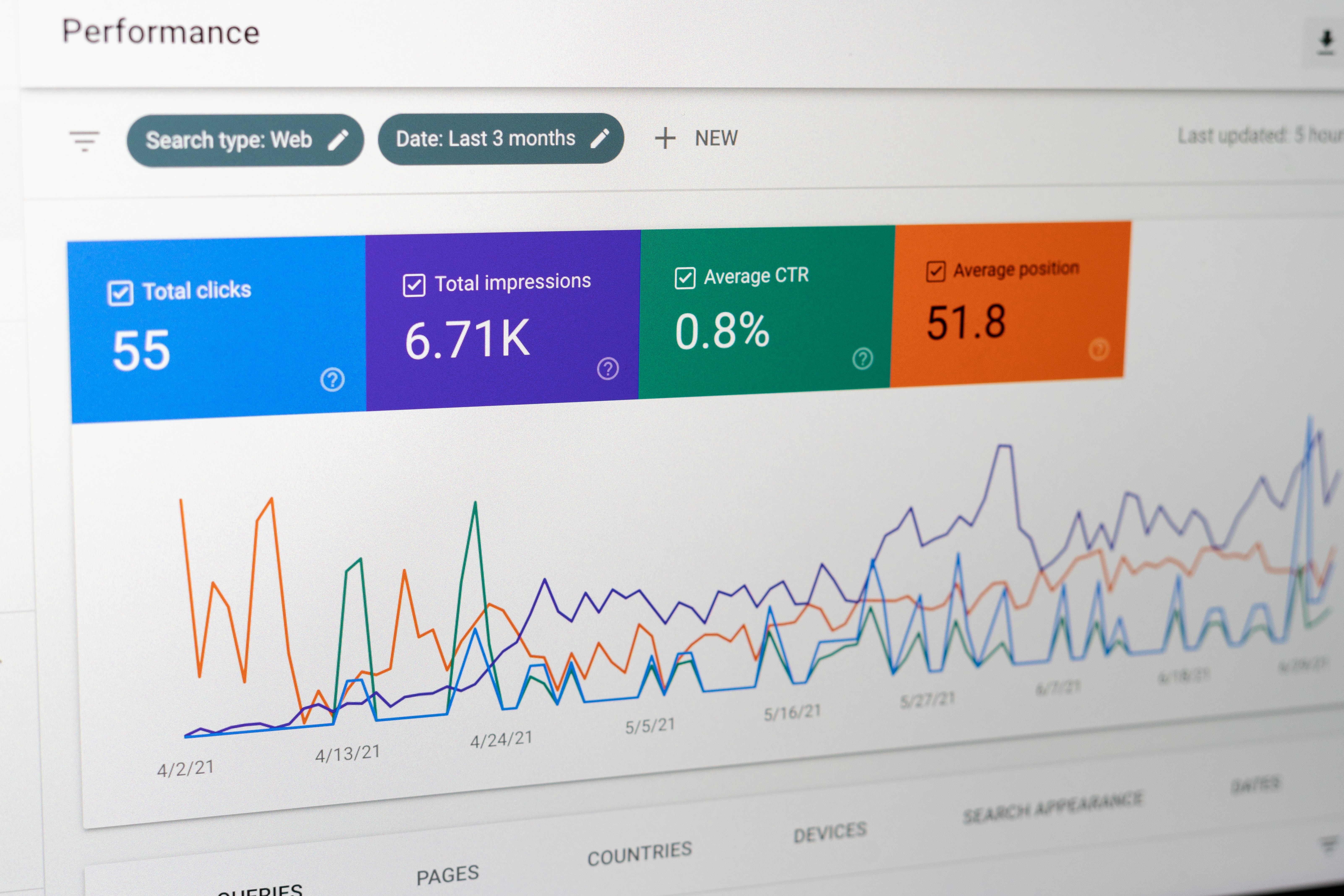Unlock the Power of SEO Tracking for Optimal Website Performance
Stay informed about your website's performance in search results with our professional SEO tracking. Measure the impact of your optimization efforts and make data-driven decisions. Get real-time insights into your SEO performance with our advanced tracking solutions. Identify trends, track keyword rankings, and monitor competitor activities.





Track Your SEO Success: Stay Ahead in the Search Engine Game


Get Data-Driven: Track, Analyze, and Enhance Your SEO Efforts
Master the Art of SEO Tracking: Maximize Your Website's Potential

Boost Your Search Rankings with Precision SEO Tracking Solutions
Stay ahead of algorithm changes and industry trends with our reliable SEO tracking. Adapt your strategy and maximize your online visibility. Monitor your website's search engine rankings and organic traffic with our robust SEO tracking tools. Identify areas for improvement and achieve better search visibility.


Drive Organic Growth: Harness the Power of Effective SEO Tracking
Q: What is SEO tracking, and why is it important?
In the ever-evolving world of digital marketing, search engine optimization (SEO) plays a pivotal role in driving organic traffic and improving online visibility. However, it's not enough to implement SEO strategies and hope for the best. To truly succeed, you need to track and analyze the performance of your SEO efforts. This is where SEO tracking comes into play. In this section, we will explore what SEO tracking is, why it is important, and how it can empower your business to achieve its online goals.
What is SEO Tracking?
SEO tracking involves monitoring and measuring various metrics and data points related to your website's performance and visibility in search engine results. It provides valuable insights into how your website is performing in terms of organic traffic, keyword rankings, backlinks, user engagement, and more. By tracking these metrics, you can assess the effectiveness of your SEO strategies and make data-driven decisions to improve your website's visibility and rankings.
The Importance of SEO Tracking:
2.1. Measure SEO Performance:
SEO tracking allows you to measure the performance of your SEO efforts. It provides you with tangible data on metrics such as organic traffic, conversion rates, and keyword rankings. By tracking these metrics over time, you can assess the effectiveness of your SEO strategies and make informed decisions to optimize your website for better performance.
2.2. Identify Opportunities and Challenges:
SEO tracking helps you identify both opportunities and challenges in your SEO campaigns. By analyzing data related to keyword rankings, backlinks, and competitor analysis, you can uncover untapped keyword opportunities, discover areas where your competitors are outperforming you, and identify potential gaps in your SEO strategy. This information empowers you to refine your approach, capitalize on opportunities, and address any weaknesses to gain a competitive advantage.
2.3. Adapt to Algorithm Changes:
Search engine algorithms are constantly evolving, and staying updated is crucial for maintaining your website's visibility and rankings. SEO tracking helps you monitor algorithm updates and their impact on your website's performance. By analyzing fluctuations in rankings or organic traffic, you can identify if your site has been affected by algorithm changes and take proactive measures to adapt your SEO strategy accordingly. This ensures that your website remains optimized and resilient to algorithm updates, allowing you to maintain a competitive edge in search engine results.
2.4. Optimize Content Strategy:
SEO tracking provides insights into how your content is performing in search engine results. By tracking keyword rankings and analyzing user behavior, you can determine which content is driving the most organic traffic and engagement. This information allows you to optimize your content strategy by identifying high-performing keywords, improving existing content, and creating new content that aligns with user intent and search trends.
2.5. Enhance User Experience:
User experience is a crucial factor in SEO success. SEO tracking helps you understand how users interact with your website and identify areas for improvement. By analyzing metrics such as bounce rate, time on page, and click-through rates, you can uncover potential pain points or areas where users are not engaging with your site effectively. This data empowers you to make data-driven decisions to enhance your website's usability, navigation, and overall user experience, resulting in increased engagement and conversions.
2.6. Competitor Analysis:
SEO tracking allows you to monitor your competitors' performance and compare it to your own. By analyzing their keyword rankings, backlinks, and content strategies, you can identify opportunities to outperform them in search engine results. This competitive intelligence helps you differentiate your brand, refine your SEO strategies, and gain a competitive edge in your industry.
How to Implement SEO Tracking:
To effectively implement SEO tracking, consider the following steps:
3.1. Define Key Metrics:
Identify the key metrics and data points that align with your SEO goals. These may include organic traffic, keyword rankings, backlinks, conversion rates, and user engagement metrics.
3.2. Set Up Analytics Tools:
Utilize robust analytics tools such as Google Analytics and SEO tracking software to track and measure your chosen metrics. These tools provide comprehensive data and insights into your website's performance.
3.3. Regularly Monitor and Analyze Data:
Consistently monitor and analyze the data provided by your analytics tools. Look for trends, anomalies, and opportunities to optimize your SEO strategies. Regularly review your keyword rankings, organic traffic patterns, and user engagement metrics to identify areas for improvement.
3.4. Make Data-Driven Decisions:
Use the insights gained from SEO tracking to make data-driven decisions. Adjust your SEO strategies, content optimization, and website improvements based on the data to enhance your website's visibility and rankings.
Conclusion:
SEO tracking is a crucial component of a successful digital marketing strategy. It allows you to measure the performance of your SEO efforts, identify opportunities and challenges, adapt to algorithm changes, optimize your content strategy, enhance user experience, and gain a competitive edge. By implementing effective SEO tracking practices, you can unlock the full potential of your website, increase organic traffic, and achieve your online goals. Invest in reliable SEO tracking tools and regularly analyze your data to stay ahead of the competition and drive sustainable growth for your business.
Q: How can SEO tracking benefit my website?
In the world of digital marketing, search engine optimization (SEO) is crucial for driving organic traffic and increasing online visibility. However, simply implementing SEO strategies is not enough. To truly harness the power of SEO and ensure the success of your website, it is essential to track and monitor its performance. In this section, we will explore how SEO tracking can benefit your website and empower you to achieve your online goals.
Measure the Effectiveness of Your SEO Efforts:
SEO tracking allows you to measure the effectiveness of your SEO strategies and campaigns. By monitoring key metrics such as organic traffic, keyword rankings, and conversion rates, you can gain valuable insights into how well your website is performing in search engine results. This data enables you to assess the impact of your SEO efforts, identify areas for improvement, and make data-driven decisions to optimize your website's performance.
Identify Opportunities for Optimization:
SEO tracking provides you with valuable data that can help identify optimization opportunities for your website. By analyzing metrics such as keyword rankings, backlinks, and user engagement, you can uncover areas where your website is underperforming or missing out on potential traffic. This information allows you to refine your SEO strategy, optimize your content, and target new keywords to attract more organic traffic and improve your website's visibility.
Stay Ahead of Algorithm Changes:
Search engine algorithms are constantly evolving, and staying up to date with these changes is vital for maintaining your website's visibility and rankings. SEO tracking helps you stay ahead of algorithm updates by monitoring any fluctuations in your keyword rankings or organic traffic. By identifying the impact of algorithm changes on your website's performance, you can adjust your SEO strategies accordingly, ensuring that your website remains optimized and resilient to algorithmic shifts.
Improve User Experience:
User experience plays a significant role in SEO success. SEO tracking allows you to gather data on user behavior, such as bounce rates, time on page, and click-through rates. By analyzing this data, you can identify areas where users may be experiencing difficulties or where your website can be enhanced to improve engagement and conversions. By addressing these issues, you can create a seamless and enjoyable user experience that encourages visitors to stay longer on your site and increases the likelihood of conversions.
Monitor Competitor Performance:
SEO tracking also enables you to monitor the performance of your competitors. By analyzing their keyword rankings, backlink profiles, and content strategies, you can gain valuable insights into their SEO tactics and identify areas where you can differentiate and outperform them. This competitive intelligence allows you to refine your own SEO strategy, capitalize on gaps in the market, and gain a competitive edge.
Track Progress and Set Goals:
SEO tracking provides you with tangible data that helps you track your progress and set achievable goals. By consistently monitoring your website's performance, you can measure the impact of your optimization efforts, track improvements in keyword rankings and organic traffic, and set realistic targets for your future SEO initiatives. This data-driven approach ensures that you stay focused, motivated, and aligned with your overall digital marketing objectives.
Conclusion:
SEO tracking is a powerful tool that can significantly benefit your website's performance and success. By measuring the effectiveness of your SEO efforts, identifying optimization opportunities, staying ahead of algorithm changes, improving user experience, monitoring competitor performance, and setting goals, you can maximize the impact of your SEO strategies and drive sustainable growth for your website. Invest in reliable SEO tracking tools, consistently analyze your data, and make informed decisions to ensure that your website remains optimized, visible, and competitive in the ever-evolving digital landscape. Embrace the power of SEO tracking and unlock the full potential of your online presence.
Q: How can SEO tracking help me measure the ROI of my SEO campaigns?
In the world of digital marketing, return on investment (ROI) is a crucial metric that measures the effectiveness and success of any campaign. When it comes to search engine optimization (SEO), tracking and measuring ROI can be a complex task. However, with the right tools and strategies, SEO tracking can provide valuable insights into the ROI of your SEO campaigns. In this section, we will explore how SEO tracking can help you measure the ROI of your SEO efforts and make informed decisions to optimize your campaigns.
Track Organic Traffic and Conversions:
SEO tracking allows you to monitor the organic traffic generated by your SEO campaigns. By analyzing the number of visitors coming to your website from organic search results, you can assess the effectiveness of your SEO strategies in driving targeted traffic. Furthermore, by tracking conversions, such as form submissions, purchases, or inquiries, you can directly attribute revenue or leads generated to your SEO efforts, providing a clear indication of the ROI.
Analyze Keyword Rankings:
One of the key objectives of SEO campaigns is to improve keyword rankings and visibility in search engine results. SEO tracking tools enable you to monitor the progress of your targeted keywords and track their rankings over time. By analyzing the fluctuations in keyword rankings, you can evaluate the impact of your optimization efforts and determine the ROI based on improved visibility for high-value keywords.
Measure Revenue and Sales:
For e-commerce websites, tracking the revenue generated from organic search is crucial in measuring the ROI of SEO campaigns. By integrating SEO tracking with your website's analytics and e-commerce platforms, you can attribute revenue directly to organic search visits. This data allows you to calculate the ROI by comparing the revenue generated against the investment made in your SEO initiatives.
Evaluate Cost per Acquisition (CPA):
In addition to revenue, calculating the cost per acquisition (CPA) is essential for determining the ROI of your SEO campaigns. By tracking the expenses associated with your SEO efforts, including content creation, link building, and SEO tools, you can divide the total cost by the number of conversions generated. This analysis provides valuable insights into the effectiveness and efficiency of your SEO campaigns in acquiring customers or leads at a reasonable cost.
Assess Lifetime Value (LTV) of Customers:
SEO tracking helps you understand the long-term value of customers acquired through organic search. By analyzing customer behavior, repeat purchases, and customer lifetime value (LTV), you can determine the impact of your SEO campaigns on customer retention and loyalty. This information enables you to evaluate the ROI based on the long-term revenue generated by customers acquired through SEO efforts.
Compare Performance Metrics:
SEO tracking allows you to compare various performance metrics before, during, and after your SEO campaigns. By analyzing metrics such as organic traffic, keyword rankings, conversions, revenue, and engagement, you can assess the impact of your SEO initiatives over time. This analysis helps you identify trends, patterns, and areas for improvement, allowing you to make data-driven decisions to optimize your campaigns and maximize the ROI.
Refine Your SEO Strategy:
SEO tracking provides valuable insights into the performance of your SEO campaigns, allowing you to refine and optimize your strategy. By identifying successful tactics, keyword opportunities, and areas of improvement, you can allocate resources more effectively, focus on high-performing areas, and eliminate strategies that yield low ROI. This iterative approach to SEO ensures that you continually improve your campaigns and maximize your return on investment.
Conclusion:
Measuring the ROI of SEO campaigns is essential for assessing the success and effectiveness of your SEO efforts. By leveraging SEO tracking tools and strategies, you can track organic traffic, analyze keyword rankings, measure revenue and sales, evaluate cost per acquisition, assess customer lifetime value, compare performance metrics, and refine your SEO strategy. These insights empower you to make informed decisions, optimize your campaigns, and maximize the ROI of your SEO initiatives. Embrace the power of SEO tracking and unlock the full potential of your SEO campaigns.
Q: Is SEO tracking a one-time process, or should it be an ongoing practice?
Search engine optimization (SEO) is an ever-evolving discipline that requires constant monitoring and adjustment to stay ahead of the competition and maintain a strong online presence. While SEO tracking is often seen as a one-time process to measure the initial impact of your optimization efforts, it is crucial to understand that it should be an ongoing practice. In this section, we will explore why SEO tracking should be a continuous endeavor, the benefits it provides, and how it helps you adapt to the ever-changing digital landscape.
Keep Up with Algorithm Updates:
Search engine algorithms are constantly evolving to provide users with the most relevant and valuable search results. Major search engines like Google frequently update their algorithms, introducing new ranking factors and changing the way websites are evaluated. By implementing ongoing SEO tracking, you can stay informed about these algorithm updates and adjust your strategies accordingly. This proactive approach ensures that your website remains optimized and visible in search results, maintaining your competitive edge.
Monitor Keyword Performance:
Keywords form the foundation of any successful SEO strategy. However, keyword popularity and search trends can change over time. By continuously tracking keyword performance, you can identify emerging trends, discover new keyword opportunities, and adapt your content and optimization efforts accordingly. Ongoing SEO tracking allows you to monitor keyword rankings, search volume, and competition, ensuring that your website remains optimized for the most relevant and effective keywords.
Identify New Competitors:
In the dynamic digital landscape, new competitors can emerge at any time. Regular SEO tracking helps you identify new players in your industry or niche, allowing you to analyze their strategies and adjust your own accordingly. By monitoring their rankings, content, and backlink profiles, you can gain valuable insights and find new opportunities to improve your own website's performance. Staying vigilant and adaptable in your SEO tracking efforts ensures that you can stay ahead of both existing and new competitors.
Track Website Performance:
SEO tracking goes beyond keyword rankings and traffic analysis. It also involves monitoring various website performance metrics such as page load speed, mobile responsiveness, user engagement, and bounce rates. By continuously tracking these metrics, you can identify any performance issues that may impact your search visibility and user experience. Regular monitoring allows you to make necessary optimizations, improve website performance, and enhance the overall user experience, resulting in better SEO outcomes.
Adapt to Changing User Behavior:
User behavior and preferences constantly evolve, particularly with the rise of new technologies and shifts in online habits. Ongoing SEO tracking enables you to understand how user behavior is changing and adapt your strategies to meet their evolving needs. By analyzing user engagement metrics, click-through rates, and conversion rates, you can gain insights into user preferences, identify patterns, and make data-driven adjustments to improve the overall user experience and maximize your SEO performance.
Stay Updated with Industry Trends:
The SEO landscape is a dynamic and ever-changing field, with new trends, techniques, and strategies emerging regularly. By engaging in ongoing SEO tracking, you can stay updated with the latest industry trends and best practices. This allows you to leverage new opportunities, implement innovative strategies, and stay at the forefront of SEO advancements. Continuous tracking ensures that your SEO efforts remain effective and aligned with the current industry standards.
Optimize for Local SEO:
For businesses targeting local audiences, SEO tracking becomes even more crucial. Local search trends, consumer behavior, and competitor landscape can change rapidly. Ongoing tracking helps you stay informed about local search trends, monitor the performance of your local keywords, and evaluate your local search visibility. By staying proactive in your SEO tracking efforts, you can make the necessary adjustments to optimize your website for local searches and maintain a strong presence in your target market.
Conclusion:
SEO tracking should not be treated as a one-time process but rather as an ongoing practice. By continuously monitoring and analyzing your website's performance, keyword rankings, user behavior, and industry trends, you can adapt your SEO strategies to stay ahead of the competition and maintain a strong online presence. In the fast-paced digital landscape, regular SEO tracking ensures that your website remains optimized, relevant, and visible in search engine results. Embrace the benefits of ongoing SEO tracking and position your website for long-term success in the ever-changing world of SEO.
In the rapidly evolving digital landscape, staying on top of your SEO performance is crucial for achieving online success. SEO tracking allows you to monitor and analyze the effectiveness of your search engine optimization efforts, enabling you to make data-driven decisions and optimize your strategies for maximum results. At Generation One, we offer comprehensive SEO tracking services that provide valuable insights into your website's performance, keyword rankings, organic traffic, and much more. In this section, we will explore the importance of SEO tracking and how it can empower your business to achieve its online goals.
- Understand Your Website's Performance:
SEO tracking provides a comprehensive view of your website's performance, giving you key metrics and analytics to assess its health and effectiveness. By monitoring metrics such as organic traffic, bounce rate, average session duration, and conversion rates, you can gain valuable insights into how your website is performing and identify areas for improvement. With this data in hand, you can optimize your website structure, content, and user experience to enhance its performance and increase its visibility in search engine results.
- Track Keyword Rankings:
Keywords play a vital role in SEO, as they determine how your website ranks in search engine results. SEO tracking allows you to monitor the performance of your target keywords and track their rankings over time. By analyzing keyword rankings, you can identify which keywords are driving the most organic traffic to your site and which ones may need improvement. This information enables you to refine your keyword strategy, optimize your content, and target high-value keywords that align with your business objectives.
- Identify Opportunities and Challenges:
Through SEO tracking, you can uncover valuable insights into the opportunities and challenges present in your SEO efforts. By analyzing data related to keyword performance, backlink profiles, and competitor analysis, you can identify untapped keyword opportunities, discover areas where your competitors are outperforming you, and uncover potential gaps in your SEO strategy. Armed with this knowledge, you can refine your approach, capitalize on opportunities, and address any weaknesses to gain a competitive advantage in your industry.
- Measure the Impact of SEO Efforts:
One of the primary benefits of SEO tracking is the ability to measure the impact of your SEO efforts. By tracking key performance indicators such as organic traffic, conversions, and revenue, you can assess the effectiveness of your optimization strategies. This data-driven approach allows you to determine which SEO tactics are yielding the best results and allocate your resources accordingly. Whether it's optimizing on-page elements, improving site speed, or refining your content strategy, SEO tracking provides the insights you need to measure and optimize the impact of your SEO initiatives.
- Stay Updated with Algorithm Changes:
Search engine algorithms are constantly evolving, and staying up-to-date with these changes is crucial for maintaining your website's visibility and rankings. SEO tracking helps you monitor algorithm updates and their impact on your website's performance. By analyzing fluctuations in rankings or organic traffic, you can identify if your site has been affected by algorithm changes and take proactive measures to adapt your SEO strategy accordingly. This ensures that your website remains optimized and resilient to algorithm updates, allowing you to maintain a competitive edge in search engine results.
- Improve User Experience:
A seamless user experience is an integral part of successful SEO. SEO tracking enables you to assess how users interact with your website and identify areas where you can enhance their experience. By tracking metrics such as bounce rate, time on page, and click-through rates, you can gain insights into user behavior and identify potential pain points or areas for improvement. This information empowers you to make data-driven decisions to optimize your website's usability, navigation, and overall user experience, resulting in increased engagement and conversions.
- Make Data-Driven Decisions:
Gone are the days of relying solely on intuition or guesswork when it comes to SEO. SEO tracking provides you with tangible data and metrics that help you make informed decisions. By leveraging data-driven insights, you can identify trends, set realistic goals, and measure the success of your SEO campaigns. This data empowers you to allocate resources effectively, prioritize optimization efforts, and invest in strategies that deliver the best ROI for your business.
Conclusion:
In the competitive online landscape, effective SEO tracking is a vital component of your digital marketing strategy. By utilizing Generation One's comprehensive SEO tracking services, you can gain valuable insights into your website's performance, keyword rankings, user behavior, and competitor landscape. Armed with this knowledge, you can optimize your SEO strategies, improve your website's visibility, drive organic traffic, and ultimately achieve your online goals. Don't leave your SEO success to chance – harness the power of data and maximize your online potential with our SEO tracking services. Contact Generation One today to get started on your journey to SEO excellence.